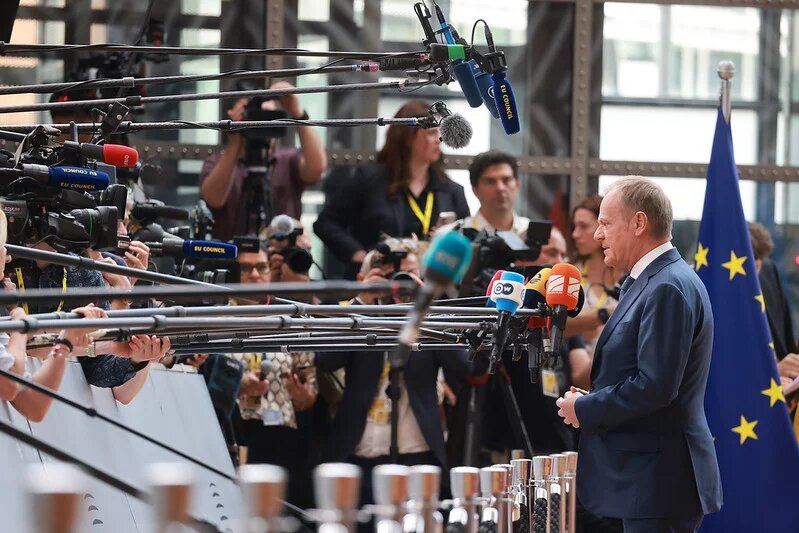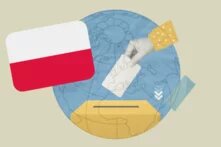On 1 January 2025, Poland will take over the six-month presidency of the Council of the EU. As part of the presidency, it will host nearly 400 councils, meetings, and conferences with the participation of representatives from 27 countries. Contrary to a common misconception, this role does not grant Poland the authority to dictate the EU's actions. Instead, the Presidency is tasked with shaping the agenda of Council meetings, which can influence the priorities during this period and set the tone for the Council's overall working dynamic. The timing of Poland’s Presidency is significant, coinciding with the start of a new three-year EU funding period 2025-2027. Poland will also inherit the role from Hungary, whose Prime Minister, Viktor Orbán, has been criticized for endorsing the Russian narrative and dismantling democracy in his own country. The following article provides insights into Poland’s priorities during the six month period.

European agricultural policy
As Poland prepares to assume the presidency of the EU Council, its agricultural priorities have taken a more specific shape. Central to the Ministry of Agriculture and Rural Development's agenda is food security, which it views as equally critical as military security. The Ministry focuses on preserving food security by enhancing the economic competitiveness of European agriculture and maintaining production capacity—including livestock production—while remaining cautious about aligning the animal farming sector with climate objectives.
Poland's presidency, coinciding with the early stages of negotiations on the post-2027 Common Agricultural Policy (CAP), presents an opportunity to shape the debate on its future reform. The Ministry aims to protect the CAP budget against growing pressures from defense spending and fiscal constraints in several member states. Other priorities include adapting the CAP to anticipated enlargement, managing trade relations with Ukraine, and addressing challenges in international trade competition and standards.
While the Ministry acknowledges climate change as a key challenge for agriculture, its approach to addressing it through the future CAP remains unclear. Undersecretary for European Affairs Magdalena Sobkowiak-Czarnecka highlighted the need for the Polish presidency to "bridge the gap between agriculture and climate activism, with a commitment to competitiveness and a practical climate framework." However, this contrasts with repeated statements from Ministry representatives calling for a “profound revision” of the European Green Deal, aiming to make it “more realistic,” “rationalized,” and “simplified.” This rhetoric follows the European Commission’s June decision to roll back some CAP conditionality requirements after protests by farmers earlier this year. Meanwhile, Czesław Siekierski - Minister of Agriculture and Rural Development of Poland has advocated for limiting spending on objectives other than agriculture from the CAP: “We believe that environmental and climate goals should be implemented through other policies, not funds for maintaining competitiveness and food security for Europe and Poland.”1
The Polish presidency is set to coincide with intense debates on the future of agriculture, as the new EU Commissioner for Agriculture and Food - Christophe Hansen is expected to present a "Vision for Food and Farming," based on the Strategic Dialogue on Agriculture findings. Ultimately Poland is set to play a leading role in shaping the debate on the Vision for Agriculture and Food announced by the Commission.
Energy and climate
The Polish Presidency also coincides with the new European Commission's (EC) term under Ursula von der Leyen, which will continue implementing ambitious regulations adopted previously, with Green Deal objectives at the forefront. However, it is also expected to balance these policies with a dialogue-oriented approach addressing Europeans' concerns about the cost of living. Alongside decarbonization, the EC plans to prioritize European industry competitiveness through a Clean Industrial Deal, aiming to boost green technology investments to compete with the US and China. Europe must also develop a reliable electricity grid, and ensure its security against physical as well as cyber-attacks, while maintaining stable energy prices. In this context, Poland will likely raise the issue of equipment and financial support for the ongoing reconstruction of Ukraine's damaged energy sector, especially in view of the coming winter.
The Polish Presidency comes at a time when the EU is revising key strategic documents on energy and climate change, including the Energy Union Governance Regulation 2018/1999, Regulation on measures to safeguard security of gas supply 2017/1938, Electricity Emergency Preparedness Regulation 2019/941, and the notification of Nationally Determined Contributions (NDCs) for 2035 under the Paris Agreement. Other key actions include the revision of European Climate Change legislation to set 2040 reduction targets, the EC report on capacity payment mechanisms, and progress on the revision of the Emission Trading System (ETS) and the Modernisation Fund. This takes place alongside critical developments like the end of the Russian gas transit contract through Ukraine in late 2024, the synchronisation of Baltic electricity grids with Europe by early 2025, and the preparation of social climate plans by Member States by mid-2025.
Given that the Polish Presidency in 2025 will coincide with the above-mentioned key developments in energy policy, it is likely that the social dimension of the energy transition will become a priority. Social climate plans might be developed to ensure greater price predictability and protect vulnerable households from rising costs, particularly in light of the new Emissions Trading Scheme (ETS2) rules. These regulations are expected to have a significant impact on Poland, given the country's high costs for retrofitting buildings. In response, Poland may push for an increase in the budget of the Social Climate Fund to mitigate these challenges and support vulnerable populations throughout the transition.
Human Rights and the Rule of Law
At the helm of the EU Council presidency, Poland will likely navigate the sensitive issue of balancing EU oversight on democratic standards with respect for member states' sovereignty. Having seen the European Commission freeze its Cohesion and Reconstruction funds in 2021 over rule of law concerns, only for them to be released in February 2024 following promises from the new Polish government to i.e. restore judicial independence. The new government, led by Prime Minister Donald Tusk following the October 2023 parliamentary elections, faces significant challenges in undoing the reforms made by Law and Justice (PiS), since President Andrzej Duda, who remains in office, holds veto power to blocks key reforms, creating a political gridlock. Poland's 2025 presidential elections may provide an opportunity to break this impasse and pave the way for deeper reforms. Nevertheless, these promises are inherently difficult to keep and Poland’s presidency may seek to emphasize a more flexible, dialogue-based approach. This strategy could reduce pressure on the current Polish government to manage the rule of law legacy of the previous government.
Poland is likely to leverage its agenda-setting power to steer the EU's focus from democratic resilience to democratic security, aligning with the 2024-2029 Political Guidelines and Ursula von der Leyen's mission letters to the new Commissioners. While the initial emphasis was on strengthening democratic institutions in response to internal challenges, the focus has since shifted to actively protecting democracy from both internal authoritarian threats and external pressures, such as disinformation and foreign interference. This shift underscores the EU's growing recognition that safeguarding democracy is not only vital for resilience but also a strategic necessity for citizens' well-being, national security, and the stability of the European economy. Specifically, Poland may advocate for enhanced measures to combat disinformation, particularly of an anti-European and pro-Russian nature.2
The emphasis on security will likewise be reflected in the migration context. The leading party of the current Polish government portrays the border situation with Belarus as a hybrid war, announced a temporary suspension of the right to asylum and refuses the allocation scheme of the reformed and commonly agreed Common European Asylum System. While being unwilling to share the burden of the allocation mechanism and supporting countries handling high numbers of asylum seekers, Poland is likely to securitize migration, by i.e. pushing for financial aid of the EU for stronger external border controls and a shorter processing time for asylum applications. On October 15, 2024, the Council of Ministers adopted the strategic document titled "Regain Control. Ensure Security: A Comprehensive and Responsible Migration Strategy for Poland for 2025–2030". In response to opposition from NGOs regarding the government’s document and its adoption process, a public hearing was held on November 25, 2024. However, since the strategy had already been approved by the Council of Ministers, the impact of the consultations on legislative work or migration practices remains uncertain. The Helsinki Foundation for Human Rights, among others, has raised concerns about the new migration strategy, highlighting potential conflicts with national and international legal standards. Key issues include unclear legal measures that could undermine the right to asylum and violate the principle of non-refoulement. Furthermore, border barriers and buffer zones may infringe on constitutional protections, preventing individuals from applying for international protection, which would conflict with Poland's domestic and EU obligations.3
Europe and international politics
At the recent Arraiolos Group Summit, President Andrzej Duda outlined Poland’s priorities for its 2025 EU Presidency in the sphere of foreign and security policy, focusing primarily on strengthening transatlantic cooperation. Amid concerns about President Trump’s transactional approach to politics, his pledge to end the war in Ukraine in 24 hours, and skepticism toward NATO, uncertainty grows about US commitment to European security. At the same time, Trump’s focus on defense spending presents an opportunity for Poland, which has committed 35% of its defense budget to purchasing US military equipment and plans to spend 4.7% of its GDP on defense by 2025. Positioning itself as a potential broker between the US and Europe, Poland is likely to advocate for "strategic harmony" between NATO and the EU, ensuring US involvement in European security while avoiding over-reliance on any single actor. Poland’s defense posture as well geographical position it to form coalitions with the Baltic states, and Nordic countries, which share its concerns about further Russian aggression. In this context Poland's 2025 EU Presidency is likely to emphasize strengthening NATO's eastern defenses, particularly through the "East Shield" program, a $2.5 billion initiative to enhance border security and deter hostile actions from Russia and Belarus.4 This strategy could help ensure greater EU readiness to confront external threats.
Poland has also announced to prioritize EU enlargement, remaining committed to an "open door" policy for new members and working to integrate Ukraine, Moldova, and the Western Balkans. However, it must prepare to navigate resistance from EU members wary of further enlargement and potential treaty reforms. Poland strongly supports Ukraine’s EU membership and aims to accelerate its accession by supporting its goal of opening two of the six negotiation clusters during the coming six months. While advancing Ukraine’s membership, Poland will have to balance domestic economic concerns, particularly in agriculture. Despite the new White House administration's skepticism Poland has vowed to seek to strengthen EU-US relations, focusing on security and economic cooperation amid the war in Ukraine, and advocate for post-war reconstruction and energy security. In that sense the Polish presidency will visibly differ from the Hungarian approach. The former inholder of the Coucil presidency, has blocked military aid packages preventing i.e. reimbursements for arms sent to Ukraine under the European Peace Facility (EPF), leading to a backlog of €9 billion in unpaid reimbursements. Hungary's foreign minister, Péter Szijjártó, cited issues like alleged discrimination against Hungarian companies in Ukraine and the financial burden of the war as reasons for the blockades. Despite other EU member states' outrage, Hungary's veto power over the European Peace Facility (EPF), a decision-making process based on consensus, has allowed it to block key decisions.5
Lastly, Poland will focus on countering disinformation and foreign malign influence and improving societal resilience to those threats. This will involve strengthening strategic communications, reinforcing democratic institutions, and fostering cooperation between EU members and external partners. Apart from information security the impact of virtual reality on youth mental health and boosting Europe’s competitiveness by prioritizing the digital transformation have also been identified as key areas of activity.6
Bottom line
Poland's upcoming EU Council Presidency in 2025 will be framed around seven key pillars: external relations, energy, economy, food, climate, health, and information, with security serving as the overarching theme. In agriculture, Poland is expected to focus on food security, promoting economic competitiveness, influencing the post-2027 Common Agricultural Policy, and advocating for a pragmatic approach to the Green Deal. In energy and climate policy, Poland will aim to balance decarbonization with economic stability, support Ukraine's energy sector, and address the social costs of the energy transition by expanding funding mechanisms. On the rule of law, Poland seeks to shift the EU’s focus from democratic resilience to democratic security, stressing counter-disinformation efforts and a securitized approach to migration. Geopolitically, Poland will work to strengthen EU-US-NATO cooperation, lead efforts against Russian aggression, and prioritize the integration of Ukraine and the Western Balkans into the EU. It remains to be seen how Poland will navigate these challenging and ambitious goals as it takes on the EU Council Presidency in 2025.
We invite you to stay up to date with events and initiatives on the official website of the Polish Presidency at www.poland25.eu.
This article first appeared here: pl.boell.org
Footnotes
- 1
European Economic and Social Committee. Security at the Forefront: Poland’s Vision for the Upcoming Polish EU Presidency. 6 Dec. 2024, https://www.eesc.europa.eu/en/news-media/press-releases/security-forefront-polands-vision-upcoming-polish-eu-presidency. Accessed 6 Dec. 2024.
- 2
Pornschlegel, Sophie. Democratic Resilience and Security. Heinrich Böll Foundation, https://eu.boell.org/en/democratic-resilience-security. Accessed 6 Dec. 2024.
- 3
Helsinki Foundation for Human Rights. Komentarz HFPC: Polityka Migracyjna, https://hfhr.pl/aktualnosci/komentarz-hfpc-polityka-migracyjna. Accessed 6 Dec. 2024.
- 4
Government of Poland. East Shield., https://www.gov.pl/web/primeminister/East-Shield. Accessed 6 Dec. 2024.
- 5
Politico. "EU Ministers Outraged as Hungary Blocks Military Aid to Ukraine." Politico, 5 Dec. 2024, https://www.politico.eu/article/eu-ministers-outrageous-hungary-blocks-military-aid-arms-ukraine/. Accessed 6 Dec. 2024.
- 6
Business Insider Polska. Wizja Polskiej Prezydencji w Unii Europejskiej 2025. 6 Dec. 2024, https://businessinsider.com.pl/wiadomosci/wizja-polskiej-prezydencji-w-…. Accessed 6 Dec. 2024.


